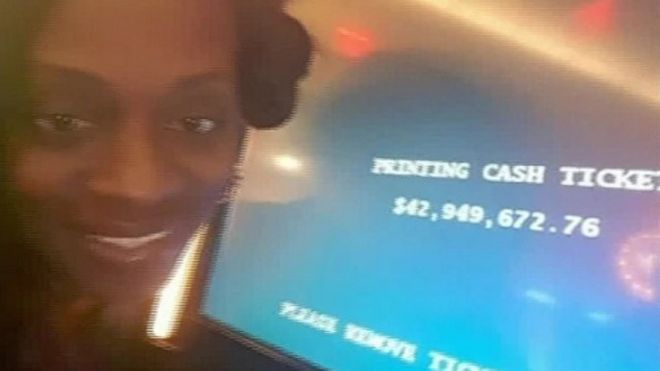- May 9, 2013
- 2,417
- 75
- 91
I think this was caused by an apparent programming error and/or hardware fault/glitch. Because 32 bits are commonly used in programs these days, and 2^32 = 4,294,967,296
Which is suspiciously similar to her apparent "winnings" of "$42,949,672.76". (See picture below).
E.g. A communications error (hardware glitch), or unset memory location or bug or something, set the variable to all hex $FF's, or similar.
On the one hand I think she is trying it on, wanting $43 million, from a (presumably) low payout gaming machine.
But on the other, I think she should have had more compensation, such as $1,000 or something.
Really, they should have fixed the machine/bug/fault(s) and not really had this problem in the first place.
http://www.bbc.co.uk/news/world-us-canada-40300062

Which is suspiciously similar to her apparent "winnings" of "$42,949,672.76". (See picture below).
E.g. A communications error (hardware glitch), or unset memory location or bug or something, set the variable to all hex $FF's, or similar.
On the one hand I think she is trying it on, wanting $43 million, from a (presumably) low payout gaming machine.
But on the other, I think she should have had more compensation, such as $1,000 or something.
Really, they should have fixed the machine/bug/fault(s) and not really had this problem in the first place.
http://www.bbc.co.uk/news/world-us-canada-40300062
A US woman is suing a casino that told her the slot machine displaying a $43m (£34m) jackpot was faulty and offered a steak dinner instead, reports say.
Katrina Bookman took a selfie showing the machine saying "printing cash ticket $42,949,672.76" at the Resorts World Casino in New York last August.
But she was escorted out and was told the next day she could have only $2.25 (£1.76).
Her lawyer, Alan Ripka, says she is entitled to the full amount displayed.
The lawsuit filed at the Queens County Supreme Court said the Sphinx slot machine's "bells, noises and lights" as well as the message on the screen told Ms Bookman she had won the jackpot, Courthouse News reported.
The subsequent disappointment left Ms Bookman anxious and depressed, the report said.
She is seeking damages from the casino for failing to maintain the slot machine as well as two companies that make and operate games machine, reports said.
A Resorts World spokesman said at the time that the machine had suffered an "obvious malfunction".
The New York State Gaming Commission said the machine had been displaying a disclaimer that said "malfunctions void all pays and plays".
But Mr Ripka told US media at the time that the casino had not responded to requests for an explanation about how the slot machine malfunctioned.
In 2011 the Iowa Supreme Court denied an 87-year old grandmother a payout of $42m after a Miss Kitty slot machine showed a message saying she had won a bonus of that amount.
The casino said it had been a malfunction and offered her $1.85 based on the symbols the machine was displaying at the time.



